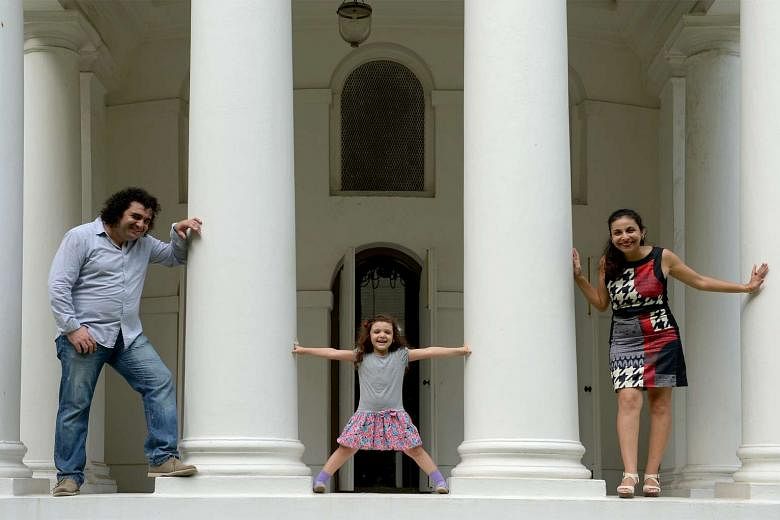Armenian violinist and music teacher Ani Umedyan has lived here since 2008, but still thinks it strange when Singaporeans ask: "Have you eaten?"
Ms Umedyan, 34, who is married to Armenian musician Gevorg Sargsyan, also 34, recalls her initial reaction: "Whenever people asked me that, I thought, why is it anyone's business whether I've had lunch or dinner?"
She teaches music part-time at Raffles Institution (RI), while her husband runs his own artiste and concert management company, besides teaching at Tanglewood Music School and Lasalle College of the Arts.
Armenians, Mr Sargsyan says, traditionally have a hearty diet of lamb, cheese and cracked wheat, but mostly "eat to live".
That, he stresses, is because it is music, not munchies, that sustains them.
"For a nice evening out in Armenia, it is not necessary to eat," he says. "But we must go to the opera, theatre or jazz club."
The arts are so vital that Armenian lawmakers debate whether the country's sole opera house and national orchestra, which employs 600 musicians full-time, are sufficient for its population of three million.
Ms Umedyan muses: "When I ask my students to come for my concerts, they will say things like, 'Sorry, Ms Ani, we have a family dinner.' Or if we are all performing in a concert together, they will say, 'Can I come, play and go because I have to attend my grandfather's birthday dinner?'"
-
Focus on early S'pore settlers
-
Most people would be hard-pressed to point out the Republic of Armenia on a map but, in September 2009, Singapore's founding prime minister Lee Kuan Yew found it significant enough to visit it for two days.
That had a lot to do with the fact that Armenians were one of Singapore's earliest settlers. There were nine of them living here when the first census of Singapore was taken in 1824.
More remarkably, the founders of two longstanding Singapore icons - The Straits Times and Raffles Hotel - were Armenian, namely Catchik Moses and the Sarkies brothers Tigran and Aviet.
The plucky and enterprising Armenians are the first among five of Singapore's oldest communities which we will feature every Thursday from today. The others are the Arabs, the Parsis, the Jews and the Dawoodi Bohras.
As different as each is, these communities actually have much in common.
Most among them found Singapore a safe haven after fleeing religious persecution in their motherlands. In fleeing the invaders, most of them travelled the same route to Singapore, that is, from Eastern Europe or the Middle East to coastal India, onwards to Yangon in Myanmar, Penang in Malaysia and then to Singapore.
Above all, they have come to love their adopted home with a passion, and so have given much to it.
It was the Arabs who gave the government of the day money to build the first public wells, bridges and various places of worship.
Parsis built South-east Asia's first soft drinks factories here, shielded and fed hundreds of homeless Singaporeans in their basements during World War II and also donated $1 million to set up Singapore's first children's ward.
Jews have long been the most trusted opticians, diamond merchants and lawyers here. One, the late David Marshall, even became Singapore's first chief minister, and another, lawyer Harry Elias, set up the first scheme to represent those who are charged with crimes and who cannot afford a lawyer.
Closely knit, the publicity-shy Dawoodi Bohras are in many ways a model community, as their faith exhorts them to be disciplined, abide by all laws and give back to society wherever they live.
In their own unique ways, these minorities have been putting the "maju" in Majulah Singapura for the past 196 years or so.
Cheong Suk-Wai
In Armenia, she says, it would be shocking if students skipped their teachers' concerts.
But a blessing involving food came in 2011, when Ms Umedyan gave birth to Paloma, their first child.
Their Singaporean friends rallied round to care for them for a week, cooking nourishing dishes such as fish and papaya soup.
The couple are from Yerevan, Armenia's capital. Mr Sargsyan's father is a choirmaster and his mother an opera singer.
Ms Umedyan used to teach at the Yerevan State Conservatory and has performed with renowned Italian tenor Andrea Bocelli. In 2008, when she received an offer from RI to do relief teaching, her husband began reading founding prime minister Lee Kuan Yew's memoir, From Third World To First, to learn more about Singapore .
In 2010, the couple and two Armenian musicians, vocalist Gayane Vardanyan and pianist Naira Mkhitaryan, formed the Armenian Heritage Ensemble to bring Armenian culture to the people here.
Four times a year, they play music by Armenian composers within the 180-year-old Armenian church in Hill Street, which is Singapore's oldest Christian church. Those who come direct from Armenia make up a third of the Singapore community, which numbers anywhere between 80 and 100.
The newer arrivals are here to study or work.
Mr Sargsyan, a trustee of the Armenian church, says: "In Armenia, we have a saying, 'Wherever the bread is, stay there.'"
About 30 members of the community are descendants of the original Armenian settlers, such as the Sarkies and the Galistans.
The rest are Armenians who have lived away from their motherland for centuries.
There are about 40,000 Armenians in Australia, 1,000 in China, 200 in Kolkata and 150 in Hong Kong.
Mr Sargsyan and his wife say they have applied for Singapore permanent residence three times without success.
He muses: "As the Singapore song goes, 'This is home… truly' and we do hope to continue living here. This is the perfect place to raise kids and expose them to the varieties of the world."
Ms Umedyan adds, with a laugh: "If you see how my daughter eats noodle soup with chopsticks, you will know how much we like living here."


